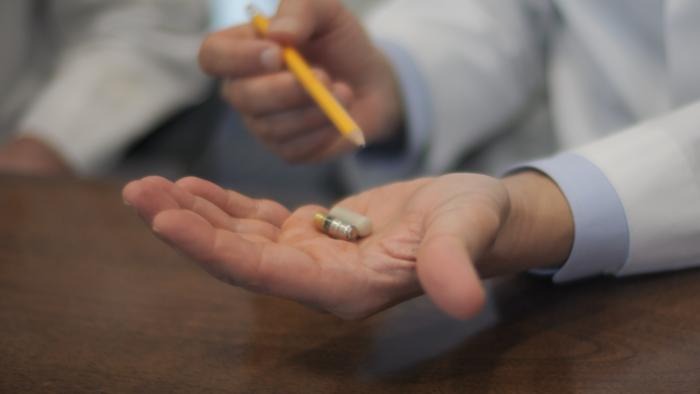Published on
Updated
Reading 2 min.
Monitor your breathing and heart rate using a pill to swallow? It is now possible with a new device presented by researchers at the Massachusetts Institute of Technology. It could facilitate the diagnosis of sleep apnea and the detection of opioid overdoses.
A laboratory the size of a cachet
In France, sleep apnea affects approximately 4% of the population. A respiratory disorder, often misdiagnosed, which could soon be identified… by the use of a simple micro-capsule.
Researchers have in fact developed an ingestible device – called “VM Pill” – capable of monitoring the body’s vital signs such as breathing and heart rate.

Its mode of operation is rather simple: the capsule monitors the micro vibrations of the body associated with breathing and heartbeat.
“The idea behind this ingestible device is that the doctor can prescribe these capsules and all the patient has to do is swallow them.“, specifies Benjamin Pless, co-author of the article.
The device detects episodes of sleep apnea
To test this promising pill, the team of researchers placed the device in the stomachs of previously anesthetized pigs.
They then gave the pigs a dose of fentanyl (a very powerful opioid analgesic, editor’s note) which caused the animal to pause in breathing. A phenomenon, which also occurs in humans, during an overdose of fentanyl.
The device measured the animal’s respiratory rate and immediately alerted scientists to the incident, who were then able to treat it.
The team then tested the device in humans, with 10 volunteers suffering from sleep apnea.
Result ? Following ingestion of the capsule, the participations did not show “no adverse effects“. Better yet, the volunteers’ respiratory rate and heart rate were measured very precisely. The device even detected an episode of sleep apnea in one of the patients.
“What we were able to show was that using the capsule we could capture data that matched what traditional transdermal sensors would capture“, explains Professor Giovanni Traverso, one of the lead authors of the study. “We also observed that the capsule could detect apnea, and this was confirmed by standard monitoring systems available in the sleep laboratory.”.
The researchers now want to improve the device, so that it can deliver drugs into the body in real time – particularly in the event of an opioid overdose.
“In the future, many situations, including opioid overdose and other respiratory and heart problems, could definitely benefit from this ingestible device.”concludes the professor.
